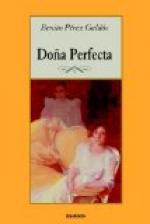Orbajosa was, in fact, tranquil. The Aceros, that warlike dynasty, worthy, in the opinion of some, of figuring in the “Romancero,” had taken possession of the neighboring province; but the insurrection was not spreading within the limits of the episcopal city. It might be supposed that modern culture had at last triumphed in its struggle with the turbulent habits of the great city of disorder, and that the latter was tasting the delights of a lasting peace. So true is this that Caballuco himself, one of the most important figures of the historic rebellion of Orbajosa, said frankly to every one that he did not wish to quarrel with the Government nor involve himself in a business which might cost him dear.
Whatever may be said to the contrary, the impetuous nature of Ramos had quieted down with years, and the fiery temper which he had received with life from the ancestral Caballucos, the most valiant race of warriors that had ever desolated the earth, had grown cooler. It is also related that in those days the new governor of the province held a conference with this important personage, and received from his lips the most solemn assurances that he would contribute as far as in him lay to the tranquillity of the country, and would avoid doing any thing that might give rise to disturbances. Reliable witnesses declare that he was to be seen in friendly companionship with the soldiers, hobnobbing with this sergeant or the other in the tavern, and it was even said that an important position in the town-hall of the capital of the province was to be given him. How difficult it is for the historian who tries to be impartial to arrive at the exact truth in regard to the sentiments and opinions of the illustrious personages who have filled the world with their fame! He does not know what to hold by, and the absence of authentic records often gives rise to lamentable mistakes. Considering events of such transcendent importance as that of the 18th Brumaire, the sack of Rome by Bourbon, or the destruction of Jerusalem—where is the psychologist or the historian who would be able to determine what were the thoughts which preceded or followed them in the minds of Bonaparte, of Charles V., and of Titus? Ours is an immense responsibility. To discharge it in part we will report words, phrases, and even discourses of the Orbajosan emperor himself; and in this way every one will be able to form the opinion which may seem to him most correct.
It is beyond a doubt that Cristobal Ramos left his house just after dark, crossed the Calle del Condestable, and, seeing three countrymen mounted on powerful mules coming toward him, asked them where they were going, to which they answered that they were going to Senora Dona Perfecta’s house to take her some of the first fruits of their gardens and a part of the rent that had fallen due. They were Senor Paso Largo, a young man named Frasquito Gonzales, and a third, a man of medium stature and robust make, who was called




